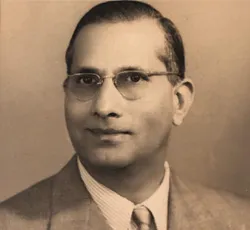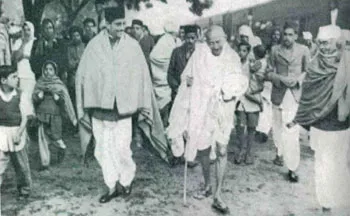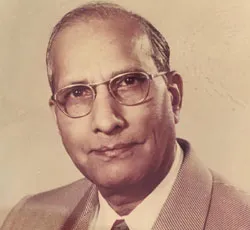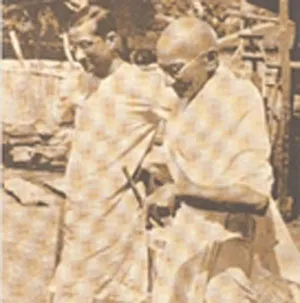Shri G. D. Birla: A visionary who transformed India
- Copy
The journey
A great leader, Shri G. D. Birla was a reformer, an industrialist, and above all a nationalist. Known for his entrepreneurial spirit and considered a doyen of Indian industry, he laid the foundation of the Birla empire. As a visionary businessman, Shri G.D. Birla has gone down in Indian history as the creator of one of India's largest industrial conglomerates. The nationalist in him took the leap to break free and create a unique business template for swadeshi businessmen, enabling India to rise as an economic superpower and put Indian industry on the world map.
Shri G.D. Birla once said, "We are driven by some force and you do things which you had never planned." His journey began in Rajasthan where he was born in a traditional Marwari family in the tiny village of Pilani in Rajasthan in 1894, on the auspicious day of Ram Navami. He was the third son of Shri Baldeodasji, the only son of Shri Seth Shiv Narayan Birla.
The roots of the Aditya Birla Group can be traced back to 1857 and the village of Pilani, when Shri Seth Shiv Narayan Birla ventured into cotton trading. Years later, Shri G.D. Birla set up the first Birla jute mill, marking his entry into the manufacturing sector. He went on to write Indian corporate history as the creator of one of the largest industrial empires studded with successful core sector companies.

Business acumen
Raised in Pilani and Calcutta (now Kolkata), Shri. G.D. Birla forayed into business during World War I. Known for his farsightedness, he was highly vocal about his support towards domestic enterprise and his distaste for foreign capital and foreign goods. He endeavoured to substitute foreign textiles with home-made cloth using the best technology available.
Over a century ago, in 1919, he forayed into industrial manufacturing by setting up the first jute mill—Birla Jute Manufacturing Co. Ltd., marking the entry of the Birla family into the industrial landscape.
The mill began operations, against tremendous odds. He eventually expanded his fledgling industrial empire with great success. In his entrepreneurial journey, he made a suite of acquisitions ranging from textiles to tea estates and thus eventually established the robust foundation of a business empire with interests across cement, aluminium, chemicals, rayon, telecom and financial services.

Freedom movement
Shri G.D. Birla's life and career changed course in 1920. He played a critical role in India's freedom struggle as a confidant of Mahatma Gandhi. While Gandhiji was passionately engaged in the political freedom of our nation, Shri G.D. Birla worked with equal obsession for the economic liberation of India. He worked shoulder to shoulder with Gandhiji in the nation's struggle for freedom, taking part in the Non-Cooperation Movement as well as Quit India Movement.
At the age of 27, he became a member of Bengal Legislative Assembly. A year earlier, he acquired the Empire newspaper and renamed it as New Empire. He also took over the Hindustan Times newspaper, which was later managed by his son Shri K.K. Birla.
‘Capital of India’
During the freedom movement, Birla House was known as the Capital of India. India's history is entwined with Birla House, now renamed Gandhi Smriti. The 12-bedroom house built by Shri G.D. Birla hosted many freedom fighters. Besides Gandhiji, Shri G.D. Birla was also closely associated with Sardar Vallabhai Patel, C. Rajagopalachari, Dr. Rajendra Prasad, Lal Bahadur Shastri and K.M. Munshi. Mahatma Gandhi died in Birla House at 5.17 pm on January 30, 1948. Lal Bahadur Shastri took advice relating to the IMF and World Bank from him. Sardar Vallabhbhai Patel, the Iron Man of India, too, died at Birla House in Bombay (now Mumbai).

Influential businessman
In the pre-independence era, Shri G.D. Birla became increasingly confrontational with Britishers because of the way they were handling Indian industry. In 1925, along with a group of pioneering industrialists, he set up the Indian Chamber of Commerce, which was closely associated with the Indian Freedom Movement, as the first organised voice of indigenous Indian industry.
From 1926, Shri G.D. Birla was one of the most influential spokesmen of India's big businesses. With Sir Purshottamdas Thakurdas, he co-founded the Federation of Indian Chambers of Commerce and Industry (FICCI), the largest and oldest apex business organisation in India, the history of which is closely interwoven with India's struggle for independence, its industrialisation, and its emergence as one of the most rapidly growing global economies. He represented India at the first and second Round Table conferences in London along with Mahatma Gandhi. In 1945, he was one of the authors of the economic development plan known as the Bombay Plan, a major private sector initiative. The period between 1921 and 1945 was one of the most crucial in Shri G.D. Birla's career, establishing him as the foremost industrialist of pre-independence India.
The philanthropist
Shri G.D. Birla wholeheartedly believed in giving. He supported the freedom struggle financially to fulfil the dream of millions of Indians of an independent India. To financially support the freedom struggle, he contributed heavily to Tilak Swaraj Fund, a homage to Bal Gangadhar Tilak on his first death anniversary, aimed at collecting Rs. 1 crore to aid India's freedom struggle and build resistance to the British rule. He gave Rs. 2 lakh for the upliftment of Harijans and soon began to lead the Harijan Sevak Sangh.
He was also a great believer in the power of education. In 1929, under Birla Education Trust, he set up a primary school focusing on the development of education in Rajasthan. In the 1940s, at the behest of Sardar Vallabhbhai Patel, Shri G.D. Birla contributed Rs. 25 lakh to establish the Birla Vishwakarma Mahavidyalaya College in Baroda (now Vadodra). He also gave Rs. 70,000 for Aligarh Muslim University and helped in setting up the Banaras Hindu University.
Shri. G. D. Birla helped shape the educational trajectory of the country. One of the institutions he founded was the prestigious Birla Institute of Technology and Sciences (BITS), Pilani. A Padma Vibhushan awardee, he also played an instrumental role in setting up several temples, planetariums and hospitals across India.

Trusteeship
Mahatma Gandhi's concept of trusteeship served as a philosophical foundation for Shri G D Birla. He once said, "It has been the policy of the House of Birla not to build up business with a view to the accumulation of capital but to develop unexplored lines, harness the undeveloped resources of the country, promote know-how, create skilled labour and managerial talent, spread education and above all, add to the efforts of the leaders of the country who have been struggling to build a new, independent India, free from want, the curse of unemployment, ignorance and disease." The Group incorporated trusteeship ideas in its purpose. This meant that a part of the profits are always ploughed back towards meaningful welfare-driven activities aimed at the larger good of society. Today, the culture of caring and giving is very much a part of Aditya Birla Group's DNA.
The legacy continues
Shri G.D. Birla passed away on 11 June 1983. Group Chairman Mr. Kumar Mangalam Birla learnt from his great grandfather that while you can get love and affection from people, there were norms to be followed. Mr. Birla reminisced that Shri G.D. Birla was very particular about things like being on time for a family function and dressing appropriately for a function. He had once been reprimanded a bit for being late for the former and made to change for the latter.
Shri G. D. Birla took great interest in his great-grandson. Mr. Birla remembers: "I was 15 when he passed away, so I have quite clear memories of him. He would take a great interest in the little things that mattered to me. If I had an exam, then no matter where he was, he would phone and ask me how I had done. If I told him I was not going to have dinner because I was going out, he would want to know where I was going. If I said I was going to Sardar, he would want to know what that was, what pav bhaji was, that sort of thing."
Mr. Birla once said that he took a very long time to get over the passing of Shri G.D. Birla. "He was my great grandfather, someone I was attached to, someone I could talk to and someone who could also get angry with me. I took a very long time to get over the fact that he passed away. I couldn't accept it because he had been hale and hearty. And suddenly he had a heart attack and passed away. Sometimes it puts into perspective the value of the person. I am really blessed that I could spend time with him. I picked up so many things from him—simple living and high thinking, nothing extravagant."
Mr. Sandeep Gurumurthi
Group Head, Communication & Brand
Aditya Birla Management Corporation Pvt. Ltd.
Call: +91-22-6652-5000 / 2499-5000
Fax: +91-22-6652-5741 / 42

















